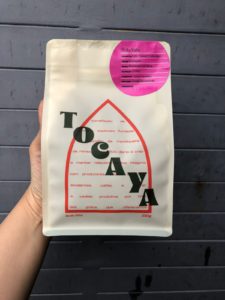São Paulo – Brazil’s roasting microbusiness Tocaya launched a new coffee earlier this week. The little pack called Yalla Yalla is connected with Arabs from its Lebanese Brazilian grower to its proceeds, part of which will be funneled to help Syria’s people. The coffee was grown by Rafic Youssef El Mouallem (pictured above by his son Gui Mohallem).
The Lebanese farmer, who came to Brazil when he was 18, now works growing organic beans. He’s the great-uncle of Juliana Ganan, founder of Tocaya The roastery used El Mouallem coffee before, when part of the value was donated to help Lebanon following a blast that hit the Beirut port in late 2020.
- Here’s more on the roasting microbusiness: Lebanese-descendant roast master creates coffee brand
This year, Ganan decided to donate to Syria, thinking especially in the many children that have only knew the reality of living in the midst of war. “I’ve chosen coffee for this particular donation, because of my uncle, who came from the Arab region. It makes perfect sense, as the donation will go to Syria this time. And the institution we’re going to donate to is the UN. A graduate colleague of mine works with them, who have been in Syria since the unfolding of the war. And malnutrition there is very critical, as children are born in the midst of conflict,” Ganan said.

For each pack bought on the website, the roast business will donate BRL 5 to the UN World Food Programme (WFP), which is operating locally in Syria. Just like it did in the previous donation, the business will show its donation receipts on social media.
The coffee that supported the Lebanese saw its final donation value doubled by Tocaya. “Since we donated in dollar, the conversion ended up reducing the value. Last year, since it was yielding little, we doubled and reached a value around USD 400. This year it is selling well! It even surprised us, as out of 90 kg, we’ve already sold 30 kg,” Ganan said.
Organic specialty coffee
The coffee chosen is an organic product certified by the IBD, Latin America’s largest certifying body. With a limited quantity, the nano lot has only 1 and a half bag of coffee. “It’s difficult to find organic specialty coffee in Brazil. We usually find coffee with interesting bodies and acidities, but not necessarily organic,” Ganan stressed.
Yalla Yalla is grown in the city of Brazópolis, Minas Gerais, and is the result of a processed coffee called pulped natural. The product is described by the roast master as a very elegant coffee with molasse and slightly floral notes, and citrus acidity.
Translated by Guilherme Miranda




